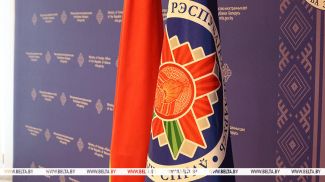MINSK, 19 March (BelTA) – Facts of genocide of the Belarusian people during the Great Patriotic War of 1941-1945 should be properly evaluated from the legal point of view. Prosecutor General Andrei Shved made the relevant statement to elaborate on the prosecution's plans mentioned during the government conference hosted by the head of state the day before. In particular, the Prosecutor General's Office intends to open a criminal case in response to the genocide of the Belarusian people during the Great Patriotic War, BelTA has learned.
Andrei Shved said: “This work began in January 2021 together with archives, primarily those of the state security system (they have a large corpus of criminal cases against war criminals), with history institutions, including the National Academy of Sciences of Belarus. Today we will finish this work. The purpose of the investigation, if one is launched, will be to keep the committed atrocities always in our memory and to give a systemic legal evaluation of these crimes as a whole.”
In his words, every year they uncover more and more information the general public was not previously aware of about the crimes and atrocities committed in Belarus' territory during the war. “Today we state that many of these facts were not given a legal evaluation back then. This is why now it is necessary to collect everything into one corpus and take a look at it as a whole. Later on if the criminal case is opened, I am convinced it will give a serious impulse for not only discussing new and known facts by the general public. It will provide the legal foundation for us to continue protecting interests of the Republic of Belarus, including in the international scene,” the prosecutor general noted.
“If criminal proceedings are launched, we will raise the matter of extraditing some criminals, who turned out to be alive, within the framework of international agreements. We will raise the matter of foreign work of investigation and law enforcement bodies, including in the countries that have tried to arrange a color revolution in Belarus. We will ask them many questions within the framework of the legal aid mechanism. Legal grounds for resolving many other important issues will emerge,” Andrei Shved said.













